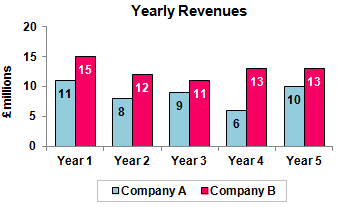Mental Arithmetic for Numerical Reasoning
Many people that are invited to take numeracy tests often think that basic knowledge of mathematic is all they need in order to pass such assessment. However this may not be necessarily the truth. Bear in mind that numerical reasoning is not about testing your math skills but rather your mental or intellectual abilities; that is, the degree to which your mind can make sense of quantitative data.
Hence, there could be a great difference in score between two people with the same maths knowledge who would undertake the same quantitative test. The person with lower mental arithmetic skills would score far lower than the person with higher skills even thought their level of maths would be at the same level. Note that numerical reasoning is all about employing your cognitive or intellectual aptitude to tackle the problem and come up with a solution. Thus, the ability to perform arithmetic operations mentally in your head is an essential base of such assessments.
How to analyse data in numeracy tests
Often aptitude tests involve questions in which you have to analyse large quantity of data in very short time. To arrive at the correct answer quickly you may not have enough time to input each value into your calculator but rather you would use your critical thinking or mental arithmetic to support your reasoning. To demonstrate how such skills could be used to analyse data in selection tests consider the question and related figure below.
 |
In which year was the ratio of revenue of company B to revenue of company A the lowest?
To answer the above question quickly you should compute the data mentally in your head. Notice, that by careful inspection of figures for each set of bars you should spot that 11/9 represents the lowest ratio. Why, because if you divide revenues of company B with company A for each year you would get the lowest figure in year 3. However note that such computations must be performed mentally in your head rather than using your calculator. If you lack these competencies read how to improve mental arithmetic to train your brain to quickly eyeball and eliminate unlikely answers. Remember, in your quantitative test you need to be able to check large set of data quickly and make accurate judgments by visual inspection. To view further example questions with full explanations see mental aptitude calculations.
Manipulating with numerical data
Another set of questions frequently used in numerical reasoning tests designed to assess your degree of mental arithmetic abilities are currency conversions. Note that in order to convert one currency into another all you need to do is multiply or divide value of one currency with exchange rate. Despite of such simplicity, currency conversion questions may be one of the most difficult questions that may appear in your selection exercise as they require you to use your metal arithmetic abilities to make sense of data and formulate steps to tackle the problem.
If you are not acquainted with these then you can refer to our currency conversion practice guide where you will learn how to establish what figures using what exchange rate will have to be converted into what currency. Note that all these steps would have to be formulated in your mind and you would use calculator only to calculate the actual figures. Hence, it is pertinent to improve your mental skills to pass numerical psychometric tests.

